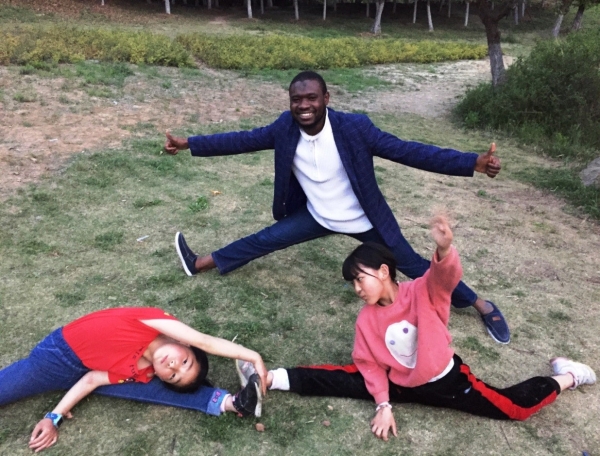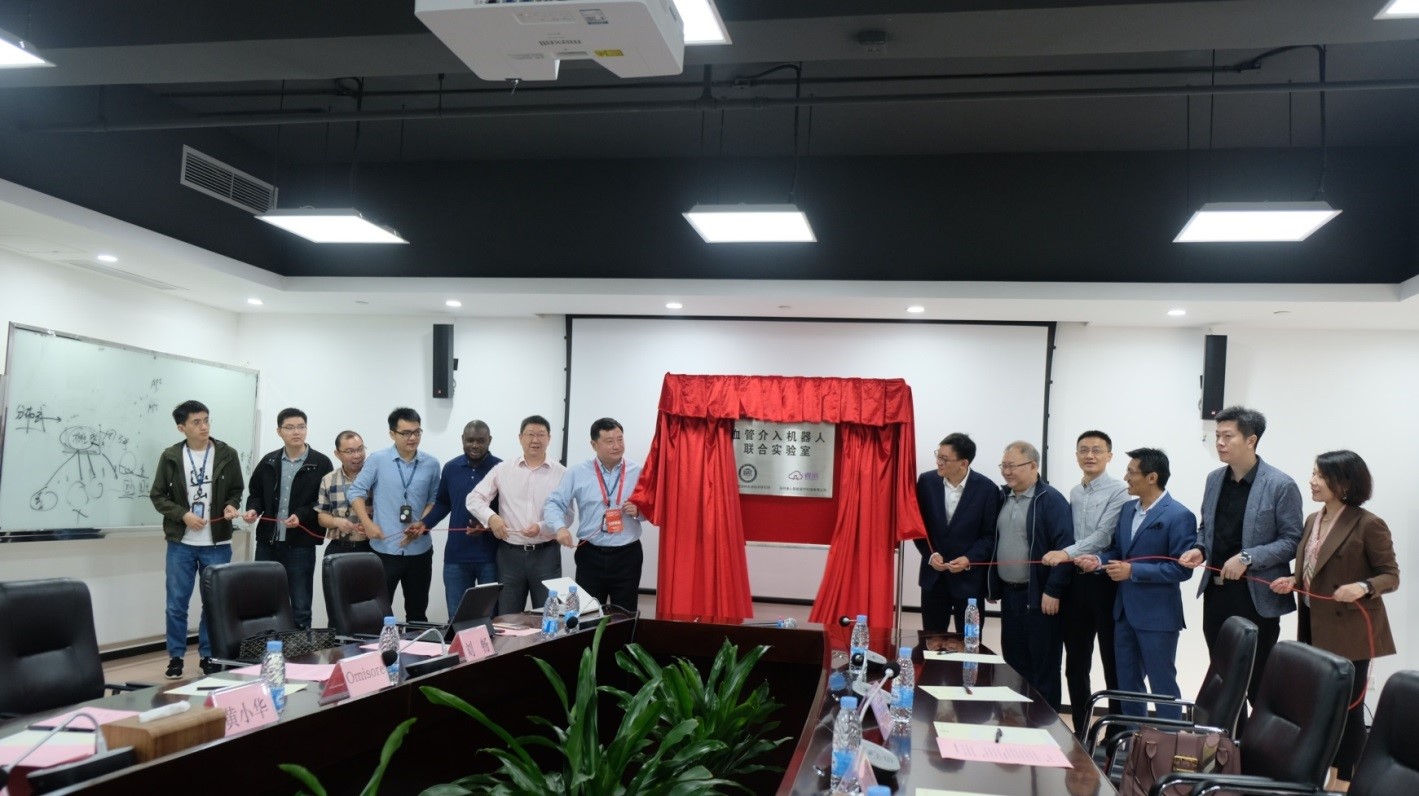
Try New Ways of Life
Omisore Olatunji Mumini came to China in September 2015, when he started his PhD program at the University of the Chinese Academy of Sciences (UCAS). "After obtaining my master's degree at the Federal University of Technology Akure in Nigeria, I wanted to try something new. I applied for the doctoral degree to study and develop new control systems for minimally invasive flexible surgical robots under the Pattern Recognition And Intelligent Systems curriculum at UCAS", said Dr. Omisore. He attended course works for four months in Beijing during which he studied some basics needed for his dissertation.
Dr. Omisore felt nostalgic at first as he met and studied with students from different parts of the world. Since it was the first time to leave his home country, he had a lot of mixed feelings during his early days in Beijing. Having to learn a new culture, try new types of food and adapt to new climate compounded these feelings. Two months after his arrival to China in September 2015, the management of IC-UCAS gathered a group of international students and taught them several beautiful Chinese songs, which not only relieved Dr. Omisore from classroom stress but also won them the Gold Award in the annual intra-school singing competition in December, 2015.
As time went by in Beijing, everything got better. "I really like the life in China and some of my friends moved to the south after graduation," said Dr. Omisore, "The Institute of Biomedical and Health Engineering (an affiliated institute of the Shenzhen Institute of Advanced Technology (SIAT) of Chinese Academy of Sciences (CAS)) enjoys stellar reputation worldwide, so I wanted to find teachers there to supervise my PhD dissertation."
In 2019, he graduated from UCAS with a PhD degree in Pattern Recognition and Intelligent Systems and immediately started his postdoctoral research at the SIAT in Shenzhen, China.
Experience of Working at the SIAT
Upon his arrival in Shenzhen, Dr. Omisore wondered how he could travel around the city by using the city’s ever-busy metro system. To put it simply, he felt completely overwhelmed! Dr. Omisore was worried he'd never make new friends and get first-hand experience in Shenzhen. Three months later, he realized that he has managed to familiarize himself with different aspects of the metropolitan city and speak basic Chinese to go about daily life in China. Looking back on the past year, Dr. Omisore can see himself evolve into a better version of himself who is able to handle many things that otherwise seemed difficult when he first came to Shenzhen. The city has given him the chance to experience life in a big city with people from all over the world who come from far and wide and often stay around for a short time either to take on exciting jobs or engage in exchange programmes.

Dr. Omisore playing with kids during his visit to attend the 2019 Vision and Learning Young Scholars Seminar in Hefei. (Photo by Dr. Omisore)
A major challenge during Dr. Omisore’s study at CAS-SIAT was using lab equipment/software designed in the Chinese Language. However, this turned out to be an advantage for him as he, through attending lab meetings in Chinese, was able to master many words in Chinese and communicate with his colleagues.
As professionally advised by his supervisor Professor WANG Lei, who is a researcher at SIAT, he started postdoc by writing fellowship and grant proposals that can support his research initiative. Among these funding programs is the CAS President's International Fellowship Initiative (CAS-PIFI), a special funding program initiated to attract different types of foreign talent to CAS for scientific studies, research cooperations and exchange programmes.
"Besides CAS-PIFI, I applied for many other projects at that time, and succeeded in obtaining the National Natural Science Foundation of China (NSFC) and Shenzhen Natural Science Foundation (SNSF)," said Dr. Omisore, "It was a great honor and gave my career a wonderful start that made me stand out among my peers who had completed PhDs in my research field."
Dr. Omisore’s CAS-PIFI research focused on reducing the global mortality from cardiovascular diseases. In associated studies, he developed new learning- and physics-based control strategies for image-guided surgical robotics navigation. This includes control strategies that learn data and statistics and use them for intelligent navigation and teleoperation control, methods for vessel/tissue segmentation and tool tracking in medical images (MRI/CT/X-ray), and multimodal data-guided strategy that he pioneered for surgeon-robot catheterization with task-specific autonomy during cardiac interventions. In addition, he demonstrated the models’ usability with carefully designed case-based in-vitro and in-vivo studies.
"My CAS-PIFI project identified that intelligent control systems driven by machine learning strategies can offer effective navigation and teleoperation control of the flexible robots during intraluminal interventions," said Dr. Omisore, "I noticed many research gaps that need to be explored for bench-to-bedside translation of robotic intervention."
For instance, he discovered that machine learning could enhance intravascular interventions with provision of patient-specific morphological and functional data analytics and standardized ways for seamless multimodal data fusion. He was also the first to develop intelligent image-guided robotic technology in his study.
"I always work until late at night, and go back to my apartment with the moon already high in the sky," said Dr. Omisore, "This doesn’t bother me at all because my career in science helps me stay enthusiastic in life and I never feel lonely."
During the four years of PIFI program, Dr. Omisore published and presented 35 research articles in top-ranked journals and at various conferences. These efforts have earned him an accumulated ~1000 citations with an H-index of 16 on Google scholar.
Moreover, he won several awards including the Excellent International Graduate of UCAS in 2019, IEEE-IES in 2017 and the TWAS-Elsevier travel grants to participate in international conferences and workshops in 2019.
"I was selected to participate in the 8th Heidelberg Laureate Forum held in Heidelberg, Germany in 2021," said Dr. Omisore, "the annual forum brings together the most exceptional young mathematicians and computer scientists worldwide to meet Nobel Laureates for scientific interactions and networking."
Thoughts about China, Campus Life and Supervisor
China has recently become the fastest growing country in the world. Of course, this is awesome yet at the same time requires everyone to keep up with a fast-paced life. Shenzhen is a city that is filled with good people and boasts a nice weather, which makes work, especially at CAS-SIAT, really fantastic.
"It has been amazing working with Professor WANG Lei," said Dr. Omisore, "he is committed to sparking novel ideas from students and staff and he provides concrete support for them to put thoughts into action despite already leading multidisciplinary studies in biomedical engineering."

Dr. Omisore attends a signing ceremony of the joint laboratory. (Photo by SIAT)
Currently, he is working on Flexible Surgical Robotics and Artificial Intelligence with several projects running concurrently. This provides a solid platform for him to gain diverse academic and professional experiences required to work independently as well as to learn to be a smart leader and an effective team member. Thus, working in the Research Centre, and in SIAT in general, helped him open up several research works which remain interesting and important for the existence of humanity.
Working at SIAT-CAS involved frequently staying up late in the lab but living in China has also offered many avenues to gain pleasure and leisure time.
"I participated in UCAS International Students Ping-Pong Competition for fall semester of the 2015/2016 academic year," said Dr. Omisore, "and I won the second place in the Men’s Doubles event." And he is a good winger in football through sticking to his hobby during leisure times while in Shenzhen. He participated in the inter-school competitions in Shenzhen every year since 2016 and won second place in the 2017 football competition with the SIAT football team.

86-10-68597521 (day)
86-10-68597289 (night)

52 Sanlihe Rd., Xicheng District,
Beijing, China (100864)

